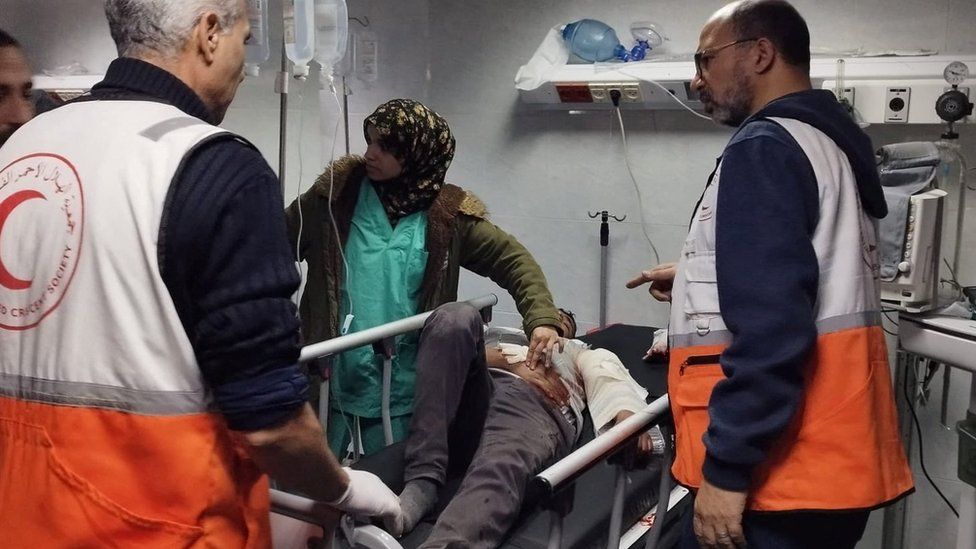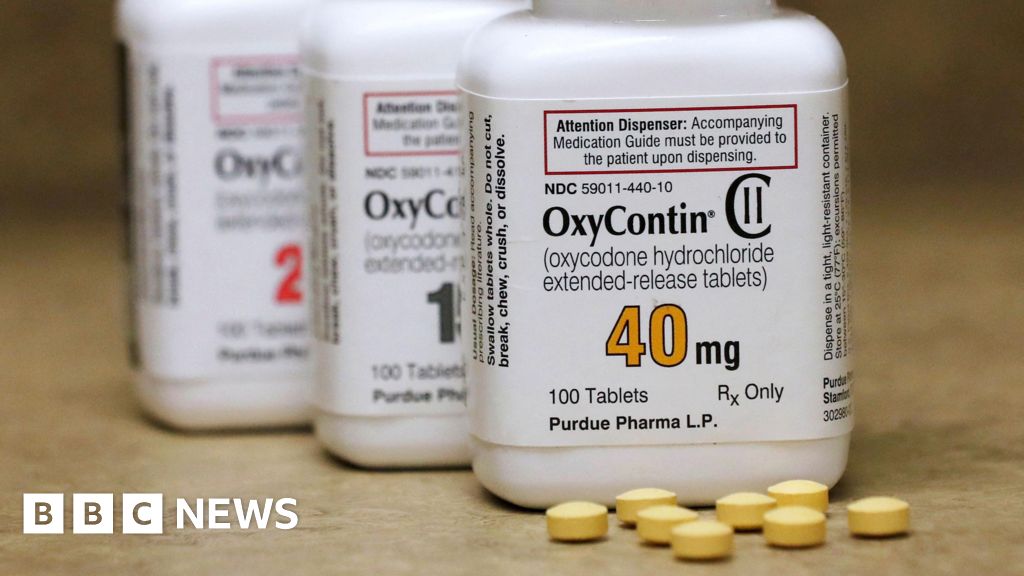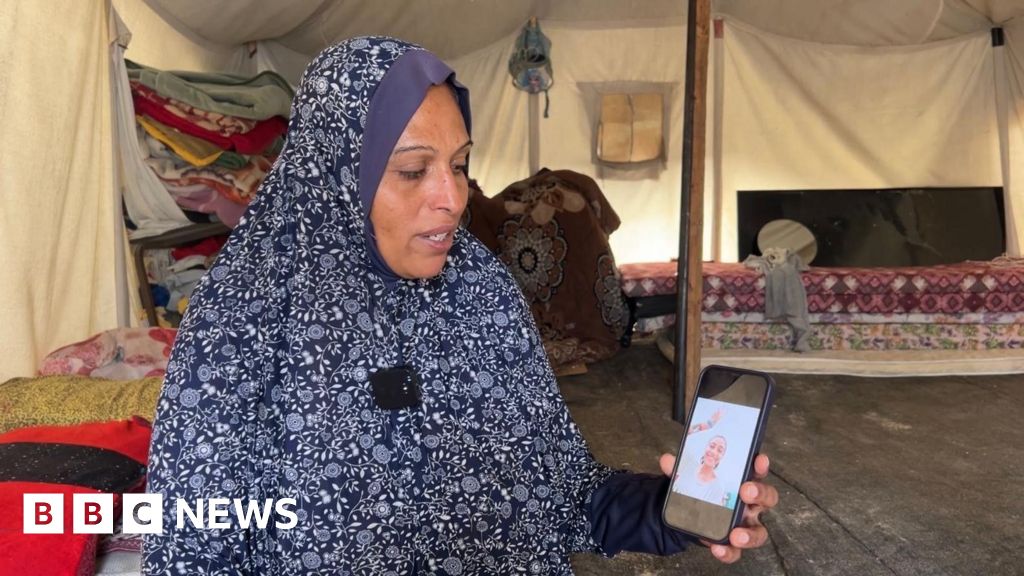ARTICLE AD BOX
 Image source, PALESTINE RED CRESCENT SOCIETY
Image source, PALESTINE RED CRESCENT SOCIETY
The Palestine Red Crescent Society said there had been heavy fighting around al-Amal Hospital in Khan Younis
The Israeli military says its ground forces have encircled Khan Younis, the southern Gaza Strip's largest city.
Troops have also reportedly advanced deeper into remaining parts of the city, where they believe Hamas leaders are hiding in tunnels with hostages.
Residents said tanks had shut the last road out of the city to the Mediterranean coast, effectively stopping them from fleeing southwards.
There was also intense fighting around the city's two main hospitals.
It came as funerals took place for some of the 24 Israeli soldiers killed on Monday on the deadliest day for the Israel Defense Forces (IDF) since the start of its ground offensive in Gaza 12 weeks ago.
At least 195 Palestinians were also killed in Gaza over the previous 24 hours, according to the territory's Hamas-run health ministry.
The ministry says more than 25,400 people have been killed - mostly children and women - during the war between Hamas and Israel.
It was triggered by an unprecedented cross-border attack by Hamas gunmen on southern Israel on 7 October, in which about 1,300 people were killed - most of them civilians - and about 250 others taken hostage.
Israeli ground forces expanded their operation into southern Gaza in early December, after largely taking control of Hamas strongholds in the north.
Within days they were said to have reached the "heart" of Khan Younis, where hundreds of thousands of people who had fled northern areas were sheltering.
But the troops have since faced fierce resistance from Hamas's Khan Younis Brigade. It is considered to be one of the two strongest in the group, which is designated as a terrorist organisation by Israel, the UK and other countries.
The Israeli operation has expanded and intensified in recent days, with dozens of people reported killed in air and artillery strikes on Monday alone as tanks pushed into the west and centre of the city.
On Tuesday, the IDF put out a statement saying that over the past day its troops had "carried out an extensive operation during which they encircled Khan Yunis and deepened the operation in the area".
The troops had "engaged in close-quarters combat, directed [air] strikes, and used intelligence to co-ordinate fire, resulting in the elimination of dozens of terrorists", it added.
Image source, EPA
Image caption,Israeli forces have pushed into the remaining parts of Khan Younis, seen as a stronghold of Hamas
The IDF also ordered residents of western Khan Younis to move immediately to the al-Mawasi area, on the Mediterranean coast, for their own safety.
However, some witnesses said tanks had blocked the road leading there, preventing them from joining the estimated million people currently sheltering to the south in Rafah, on the border with Egypt.
"I am trying to leave for Rafah but the tanks are now very near to the coast and are firing toward the west," Shaban, an electrical engineer with four children, told Reuters news agency.
The World Health Organization meanwhile said it was deeply concerned by reports of attacks on hospitals in Khan Younis.
"The situation remains extremely dangerous. Early this morning, there was direct artillery shelling of the Palestine Red Crescent's headquarters on the fourth floor. Israeli drones did not stop firing at people at al-Amal Hospital," spokeswoman Nebal Farsakh told the BBC from Ramallah.
"[There is] panic and fear among thousands of displaced people who are taking shelter inside our facilities."
There was no immediate comment from the IDF, but it has previously accused Hamas fighters of embedding themselves among the civilian population and operating in and around medical facilities.
Ms Farsakh also said ambulances were "facing significant challenges to reach wounded people and transport them to hospitals", adding that they were now being told to take critical cases to Deir al-Balah, in central Gaza.
And she warned that Al-Amal and the nearby Nasser Medical Complex - the largest of the 14 hospitals still partly working in Gaza - were "overwhelmed and overcrowded".
Dr Haytham Ahmad, who works in Nasser's emergency department, told the BBC that multiple amputations were being performed, and that in some cases, patients were not being given anaesthetic because of a shortage of supplies.
"These cases have severe crush injuries and there is just some skin and muscle still connected. We try to use limited anaesthetic in this situation," he said.
A World Health Organization spokesman said Nasser was "now basically besieged" and that there was "no way in and out" for its 400 patients, as well as the medical staff treating them and displaced civilians.
Gaza's health ministry alleged that Israeli forces had fired "heavily on the upper floors of the specialised surgery building and the emergency building" of the hospital.
One video filmed by a Palestinian journalist appeared to show gunfire hitting the hospital's western corner, while in another clip smoke is seen rising from an area to the south.
The IDF told AFP news agency that it was "not aware of the event".
Image source, EPA
Image caption,Some residents of Khan Younis were able to flee along the coastal road to Rafah
Later, UN Secretary General António Guterres said the humanitarian situation in Gaza was "appalling" and that the entire population was "enduring destruction at a scale and speed without parallel in recent history".
He also once again appealed for an immediate humanitarian ceasefire.
Qatar's foreign ministry spokesman said it was "engaging in serious discussions with both sides" on a potential deal, and a Palestinian official told the BBC that a Hamas delegation had arrived in Cairo on Tuesday morning to "discuss new proposals" with Egypt's intelligence minister.
Israel has not denied that it has proposed a two-month truce, involving the release of hostages and Palestinian prisoners. But there are reports that has already been rejected by Hamas, which demands a permanent ceasefire.

 1 year ago
100
1 year ago
100








 English (US) ·
English (US) ·